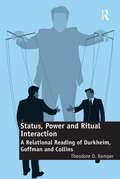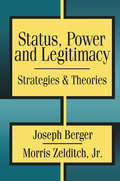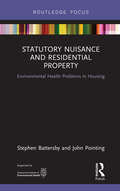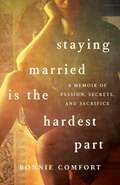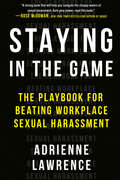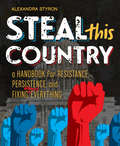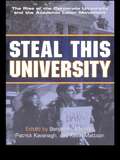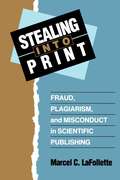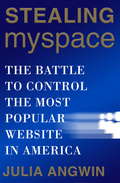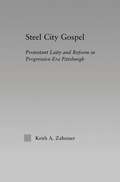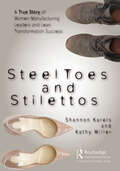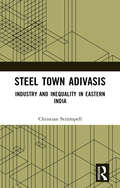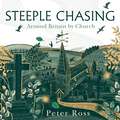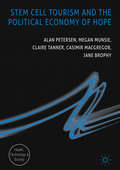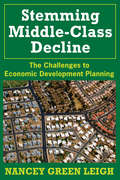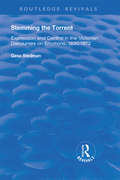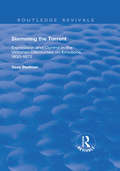- Table View
- List View
Status in Management and Organizations
by Jone L. PearcePeople go to extraordinary lengths to gain and defend their status. Those with higher status are listened to more, receive more deference from others, and are perceived as having more power. People with higher status also tend to have better health and longevity. In short, status matters. Despite the importance of status, particularly in the workplace, it has received comparatively little attention from management scholars. It is only relatively recently that they have turned their attention to the powerful role that social status plays in organizations. This book brings together this important work, showing why we should distinguish status from power, hierarchy and work quality. It also shows how a better understanding of status can be used to address problems in a number of different areas, including strategic acquisitions, the development of innovations, new venture funding, executive compensation, discrimination, and team diversity effects.
Status, Power and Ritual Interaction: A Relational Reading of Durkheim, Goffman and Collins
by Theodore D. KemperSociologists Émile Durkheim, Erving Goffman and Randall Collins broadly suppose that ritual is foundational for social life. By contrast, this book argues that ritual is merely surface, beneath which lie status and power, the behavioral dimensions that drive all social interaction. Status, Power and Ritual Interaction identifies status and power as the twin forces that structure social relations, determine emotions and link individuals to the reference groups that deliver culture and administer preferences, actions, beliefs and ideas. An especially important contention is that allegiance to ideas, even those as fundamental as the belief that 1 + 1 = 2, is primarily faithfulness to the reference groups that foster the ideas and not to the ideas themselves. This triggers the counter-intuitive deduction that the self, a concept many sociologists, social psychologists and therapists prize so highly, is feckless and irrelevant. Status-power theory leads also to derivations about motivation, play, humor, sacred symbols, social bonding, creative thought, love and sex and other social involvements now either obscure or misunderstood. Engaging with Durkheim (on collective effervescence), Goffman (on ritual-cum-public order) and Collins (on interaction ritual), this book is richly illustrated with instances of how to examine many central questions about society and social interaction from the status-power perspective. It speaks not only to sociologists, but also to anthropologists, behavioral economists and social and clinical psychologists - to all disciplines that examine or treat of social life.
Status, Power, and Legitimacy
by Joseph Berger Jr. Stephen R. Graubard Morris ZelditchStatus, Power, and Legitimacy presents methodological, theoretical, and empirical essays by Joseph Berger and Morris Zelditch, Jr.—two of the leading contributors to the Stanford tradition in the study of micropro-cesses. This three-part volume brings together major contributions to the development of this tradition, in addition to a number of newly written essays published here for the first time. Berger and Zelditch integrate the essays and relate them to a larger body of theory and research as they explore the importance of a generalizing orientation in sociology. Their view of theory as flux and process, the blending of social process with theory-building, produces a picture of the social world in line with the great tradition of George Herbert Mead, Max Weber, and Georg Simmel.Status, Power, and Legitimacy explores the relation between the scope of a theory and testing, applying, and developing it; the relation between abstract, general theories and empirical generalizations; and how to use an understanding of this relation to construct theories that are neither historically nor culturally bound. In the first part, Berger and Zelditch discuss strategies of theory construction, the development of abstract, general theories of social processes, and the different ways in which theories grow. Status processes are the focus of the second part, which includes: the formation of reward expectations; the role of status cues in interaction; the evolution of status expectations; and the application of status characteristics theory to male-female interaction. Lastly, the authors dissect power and legitimacy: the effect of expectations on power; the legitimation of power and its effect on the stability of authority; and legitimation under conditions of dissensus.This volume is a fine theoretical effort of great depth and breadth. Berger and Zelditch review the background of each paper, place the new concepts and principles introduced by each paper in context and examine subsequent research generated by the paper. They carve out new research areas in the social world of class, status, power, and authority. This volume will be of interest to those in the fields of sociology and, in particular, social theory.
Status: Why Is It Everywhere? Why Does It Matter?
by Cecilia L. RidgewayStatus is ubiquitous in modern life, yet our understanding of its role as a driver of inequality is limited. In Status, sociologist and social psychologist Cecilia Ridgeway examines how this ancient and universal form of inequality influences today’s ostensibly meritocratic institutions and why it matters. Ridgeway illuminates the complex ways in which status affects human interactions as we work together towards common goals, such as in classroom discussions, family decisions, or workplace deliberations. Ridgeway’s research on status has important implications for our understanding of social inequality. Distinct from power or wealth, status is prized because it provides affirmation from others and affords access to valuable resources. Ridgeway demonstrates how the conferral of status inevitably contributes to differing life outcomes for individuals, with impacts on pay, wealth creation, and health and wellbeing. Status beliefs are widely held views about who is better in society than others in terms of esteem, wealth, or competence. These beliefs confer advantages which can exacerbate social inequality. Ridgeway notes that status advantages based on race, gender, and class—such as the belief that white men are more competent than others—are the most likely to increase inequality by facilitating greater social and economic opportunities. Ridgeway argues that status beliefs greatly enhance higher status groups’ ability to maintain their advantages in resources and access to positions of power and make lower status groups less likely to challenge the status quo. Many lower status people will accept their lower status when given a baseline level of dignity and respect—being seen, for example, as poor but hardworking. She also shows that people remain willfully blind to status beliefs and their effects because recognizing them can lead to emotional discomfort. Acknowledging the insidious role of status in our lives would require many higher-status individuals to accept that they may not have succeeded based on their own merit; many lower-status individuals would have to acknowledge that they may have been discriminated against. Ridgeway suggests that inequality need not be an inevitable consequence of our status beliefs. She shows how status beliefs can be subverted—as when we reject the idea that all racial and gender traits are fixed at birth, thus refuting the idea that women and people of color are less competent than their male and white counterparts. This important new book demonstrates the pervasive influence of status on social inequality and suggests ways to ensure that it has a less detrimental impact on our lives.
Statutory Nuisance and Residential Property: Environmental Health Problems in Housing (Routledge Focus on Environmental Health)
by Stephen Battersby John PointingStatutory Nuisance and Residential Property: Environmental Health Problems in Housing examines the statutory nuisance provisions in the Environmental Protection Act 1990 pertaining to the condition of premises and related problems in housing and compares these with the provisions of the Housing Act 2004. The book discusses the separate development of statutory nuisance and housing legislation in an historic context, which provides a useful basis for the understanding and interpretation of legislation and the different remedies available today. The work includes a chapter on actions by “persons aggrieved” using section 82 of the Environmental Protection Act 1990 and also considers remedies provided in the Anti-social Behaviour, Crime and Policing Act 2014. This book:• investigates housing problems in the context of the relevant law; and• demonstrates how to use the legal framework appropriately and be able to decide on the most appropriate provision for dealing with environmental health problems associated with residential property. This is an essential and practical book for environmental health and housing professionals, as well as for advisers and lawyers in the private and public housing sectors.
Stay Home: Housing and Home in the UK during the COVID-19 Pandemic
by Becky TunstallThe UK housing system has been described as being in ‘crisis’, but suddenly in 2020 homes were on the COVID-19 frontline, used for shielding, isolating and care. Most were used by more people, for more hours, for more activities. Many households were cut off from normal services and contacts, and many lost the means to pay for their homes. Millions of infections occurred at home, and inequalities in household type, housing space, cost and tenure contributed to the unequal impact of the pandemic. This book brings together a wealth of data, individual testimony and analysis, in one convenient resource for students, scholars and practitioners.
Staying Married is the Hardest Part: A Memoir of Passion, Secrets, and Sacrifice
by Bonnie ComfortFor fans of Lori Gottlieb&’s Maybe You Should Talk to Someone, a contemporary memoir by a psychologist whose sexual conflict with her screenwriter husband threatens to destroy her marriage.Can a loving relationship endure career setbacks, infidelities, and mismatched sexual desires? This is the question psychologist Bonnie Comfort grapples with as she navigates her unpredictable thirty-year marriage to Hollywood screenwriter Bob, while she provides marital therapy to others. Bob is affectionate, brilliant, and hilarious—but his sexual desires are incompatible with Bonnie's. Despite her misgivings, she indulges his kinks, which often include photographing her in lingerie. Their Hollywood life is exciting, but eventually Bob's growing career frustrations lead to his complete sexual shutdown. Tensions rise, and Bob suggests Bonnie have discreet affairs and not tell him. She does just that—but when she confesses her infidelities five years later, his sexual demands become more extreme. When she complies, Bonnie feels shame; when she refuses, as she increasingly does, their fights threaten to tear their marriage apart. Bonnie understands the rhythm of disconnection and repair that is common in love relationships. With honesty and vulnerability, she recounts the highs and lows of her own marriage which sadly ends with Bob's death. As she grieves, Bonnie reflects on her role in their marital struggles and offers profound insights from personal and professional experience. Her story lays bare the complexities of love, the ongoing challenges women face in intimate relationships, and how even difficult marriages can find a way to thrive.
Staying in the Game: The Playbook for Beating Workplace Sexual Harassment
by Adrienne LawrenceA practical guide to shutting down workplace sexual harassment so it doesn't derail your career or your life, from the first on-air personality to sue ESPN for sexual harassment."A strong book that will help you navigate the choppy waters of sexual harassment. Gain your power, read this book."-Rose McGowan, New York Times bestselling author of BraveEven in the #MeToo era, studies show that women in the workforce continue to harbor misconceptions about sexual harassment and are unprepared to respond when it happens. Lawyer and former ESPN anchor Adrienne Lawrence has learned to advocate for herself and other women. In this book, she offers much-needed insight on topics such as: • Identifying the five types of harassers and the five types of coworkers who enable them • Researching company culture and history to identify sexual harassment hotbeds • Properly documenting inappropriate behavior • Preparing for retaliation and mental health hurdles such as anxiety and depression • Managing public exposure and figuring out when to leverage the power of the media and/or lawyer upThis essential guide helps women navigate the complicated realities of sexual harassment and teaches them how to be their own best advocates in toxic work environments.
Steal This Computer Book 4.0: What They Won't Tell You About the Internet
by Wallace WangIf you thought hacking was just about mischief-makers hunched over computers in the basement, think again. As seasoned author Wallace Wang explains, hacking can also mean questioning the status quo, looking for your own truths and never accepting at face value anything authorities say or do.The completely revised fourth edition of this offbeat, non-technical book examines what hackers do, how they do it, and how you can protect yourself. Written in the same informative, irreverent, and entertaining style that made the first three editions hugely successful, Steal This Computer Book 4.0 will expand your mind and raise your eyebrows. New chapters discuss the hacker mentality, social engineering and lock picking, exploiting P2P file-sharing networks, and how people manipulate search engines and pop-up ads to obtain and use personal information. Wang also takes issue with the media for "hacking" the news and presenting the public with self-serving stories of questionable accuracy.Inside, you’ll discover:–How to manage and fight spam and spyware–How Trojan horse programs and rootkits work and how to defend against them–How hackers steal software and defeat copy-protection mechanisms–How to tell if your machine is being attacked and what you can do to protect it–Where the hackers are, how they probe a target and sneak into a computer, and what they do once they get inside–How corporations use hacker techniques to infect your computer and invade your privacy–How you can lock down your computer to protect your data and your personal information using free programs included on the book’s CDIf you’ve ever logged onto a website, conducted an online transaction, sent or received email, used a networked computer or even watched the evening news, you may have already been tricked, tracked, hacked, and manipulated. As the saying goes, just because you’re paranoid doesn’t mean they aren’t after you. And, as Wallace Wang reveals, they probably are.The companion CD contains hundreds of megabytes of 100% FREE hacking and security related programs, like keyloggers, spyware stoppers, port blockers, IP scanners, Trojan horse detectors, and much, much more. CD compatible with Windows, Mac, and Linux.
Steal This Country: A Handbook for Resistance, Persistence, and Fixing Almost Everything
by Alexandra StyronA walk-the-walk, talk-the-talk, hands-on, say-it-loud handbook for activist kids who want to change the world!Inspired by Abbie Hoffman's radical classic, Steal This Book, author Alexandra Styron's stirring call for resistance and citizen activism will be clearly heard by young people who don't accept "it is what it is," who want to make sure everybody gets an equal piece of the American pie, and who know that the future of the planet is now. Styron's irreverent and informative primer on how to make a difference is organized into three sections: The Why, The What, and The How. The book opens with a personal essay and a historic look at civil disobedience and teenage activism in America. That's followed by a deep dive into several key issues: climate change, racial justice, women's rights, LGBTQIA rights, immigration, religious understanding, and intersectionality. Each chapter is introduced by an original full page comic and includes a summary of key questions, interviews with movers and shakers--from celebrities to youth activists--and spotlights on progressive organizations. The book's final section is packed with how-to advice on ways to engage, from group activities such as organizing, marching, rallying, and petitioning to individual actions like voting with your wallet, volunteering, talking with relatives with different viewpoints, and using social activism to get out a progressive message. This is a perfect book for older middle-schoolers and teens who care about the planet, the people with whom they share it, and the future for us all.
Steal This University: The Rise of the Corporate University and the Academic Labor Movement
by Benjamin Johnson Patrick Kavanagh Kevin MattsonSteal This University explores the paradox of academic labor. Universities do not exist to generate a profit from capital investment, yet contemporary universities are increasingly using corporations as their model for internal organization. While the media, politicians, business leaders and the general public all seem to share a remarkable consensus that higher education is indispensable to the future of nations and individuals alike, within academia bitter conflicts brew over the shape of tomorrow's universities. Contributors to the volume range from the star academic to the disgruntled adjunct and each bring a unique perspective to the discussion on the academy's over-reliance on adjuncts and teaching assistants, the debate over tenure and to the valiant efforts to organize unions and win rights.
Stealing Into Print: Fraud, Plagiarism, and Misconduct in Scientific Publishing
by Marcel C. LaFolletteFalse data published by a psychologist influence policies for treating the mentally retarded. A Nobel Prize-winning molecular biologist resigns the presidency of Rockefeller University in the wake of a scandal involving a co-author accused of fabricating data. A university investigating committee declares that almost half the published articles of a promising young radiologist are fraudulent.Incidents like these strike at the heart of the scientific enterprise and shake the confidence of a society accustomed to thinking of scientists as selfless seekers of truth. Marcel LaFollette's long-awaited book gives a penetrating examination of the world of scientific publishing in which such incidents of misconduct take place. Because influential scientific journals have been involved in the controversies, LaFollette focuses on the fragile "peer review" process—the editorial system of seeking pre-publication opinions from experts. She addresses the cultural glorification of science, which, combined with a scientist's thirst for achievement, can seem to make cheating worth the danger. She describes the great risks taken by the accusers—often scholars of less prestige and power than the accused—whom she calls "nemesis figures" for their relentless dedication to uncovering dishonesty.In sober warning, LaFollette notes that impatient calls from Congress, journalists, and taxpayers for greater accountability from scientists have important implications for the entire system of scientific research and communication.Provocative and learned, Stealing Into Print is certain to become the authoritative work on scientific fraud, invaluable to the scientific community, policy makers, and the general public.
Stealing Myspace: The Battle to Control the Most Popular Website in America
by Julia AngwinAngwin offers a fast-paced and deeply reported look at the unlikely success of MySpace and the drama surrounding one of the biggest business deals of the Internet age.
Steel City Gospel: Protestant Laity and Reform in Progressive-Era Pittsburgh
by Keith A. ZahniserDemonstrating the power religious language, ideas, and institutions had in shaping progressive reform in Pittsburgh, this cross-disciplinary study addresses significant debates in the fields of Progressive-Era political history and American religious history, while telling the story of an industrial city in a crucial era of change.
Steel City: Hamilton and Region
by J. J. Drake L. G. Reeds M. J. DearFrom its establishment nearly 200 years ago as a village at the centre of an agricultural district, Hamilton has grown into one of Canada's biggest industrial centres, at the heart of a highly developed regional municipality. The story of its changing landscapes, both physical and human, is presented in the nineteen essays that make up this volume, all by geographers associated with Hamilton's McMaster University. Change is the essence of the story. Each contributor focuses on one aspect of the past, present, or future landscapes of Hamilton, and places it within the context of change in the region. The first series of essays explores physical landscapes – geology and relief, climate, soils, vegetation, and hydrology – and shows how human activity has moulded them. The second group charts the evolution of human landscapes in the region, paying special attention to contemporary Hamilton with its rich and diverse combination of people and cultures, and also to the political intrigue that surrounded the introduction of regional government to the area. Finally a third series focuses on the functioning of the Hamilton region. Within a highly complex system, the city and region balance a broad range of often contradictory trends and activities. The contributors examine the difficulties facing agriculture in a rapidly urbanizing region; the importance of Hamilton in caring for welfare-dependent populations; the future of steel in Steel City; the challenges posed by energy requirements in the region; and the hard choices facing policy-makers. The last two essays discuss the role played by McMaster University in the life of the region, and the landscape of Hamilton today: a remarkable complex of historical interest, great natural beauty, and modern city life.
Steel Toes and Stilettos: A True Story of Women Manufacturing Leaders and Lean Transformation Success
by Shannon Karels Kathy MillerThis book is about meaningful culture change, individual and organizational learning, leadership humanity and resilience, and organizational excellence. It documents a long, challenging, but totally inspirational account of multiple plants’ transformations, but also provides a unique window into a boss-subordinate relationship that is textured, real, and uplifting. Women in leadership (way beyond manufacturing) will be interested in this account of gifted, yet humble leadership. I am challenged to convey how much I loved the content and style of this book. Jane Dutton, Professor of Business Administration and Psychology at the University of Michigan Cofounder of the Center for Positive Organizations Kathy and Shannon are systems-based thinkers which makes their Lean Enterprise implementation successful and sustainable. Understanding their journey and challenges makes this book a must read for both new lean thinkers and seasoned lean professionals. Rick Harris, President of Harris Lean Systems, Inc. The authors joined forces professionally when Kathy hired Shannon to be a member of her leadership team. This book describes the transformation they led to convert operations from traditional manufacturing to a lean enterprise. Kathy (executive leader responsible for profitability) and Shannon (transformation leader) share the finer points of a comprehensive change process, the challenges and triumphs, and the real emotion involved during their quest for success. Each describes the professional journey from their unique perspective and the highlights of an endearing friendship that was formed along the way. This story will inspire female leaders in any organization, showcasing an example of high-performing women thriving in an intense and fast-paced world. Kathy and Shannon are role models for those juggling intense, fulfilling careers, alongside life’s complexities such as dual-career marriages and raising children. Their story provides a powerful case study of women supporting each other in the workplace to drive positive culture and significantly improved business results by leading with authenticity and inclusivity.
Steel Town Adivasis: Industry and Inequality in Eastern India
by Christian StrümpellSteel Town Adivasis: Industry and Inequality in Eastern India presents an analysis of class formation in the industrial town, Rourkela in the eastern Indian state Odisha, and the ways this process relates to regional ethnicity and caste.This study is based on long-term ethnographic research conducted in the 2000s and oral histories covering the period from the inception of the steel plant, and it focusses on the region’s ‘tribes’, indigenous people or Adivasis who lost their land when the Government of India established a large steel plant in Rourkela in the 1950s.The book will be of interest to anthropologists, sociologists, historians interested in industrial labour and work, in class, caste, Adivasis, ethnicity and their dynamic entanglement, as well as students and activists.Print edition not for sale in South Asia (India, Sri Lanka, Nepal, Bangladesh, Pakistan and Bhutan)
Steeple Chasing: Around Britain by Church
by Peter RossFrom the author of A Tomb With a View - a celebration of the weird and wonderful churches of BritainChurches are all around us. Their steeples remain landmarks in our towns, villages and cities, even as their influence and authority has waned. They contain art and architectural wonders - one huge gallery scattered, like a handful of jewels, across these isles.Award-winning writer Peter Ross sets out to tell their stories, and through them a story of Britain. Join him as he visits the unassuming Norfolk church which contains a disturbing secret, and London's mighty cathedrals with their histories of fire and love. Meet cats and bats, monks and druids, angels of oak and steel.Steeple Chasing, though it sometimes strikes an elegiac note, is a song of praise. It celebrates churches for their beauty and meaning, and for the tales they tell. It is about people as much as place, flesh and bone not just flint and stone. From the painted hells of Surrey to the holy wells of Wales, consider this a travel book . . . with bells on.Praise for Peter Ross'Ross is a wonderfully evocative writer, deftly capturing a sense of place and history, while bringing a deep humanity to his subject. He has written a delightful book.' - The Guardian'Fascinating . . . Ross makes a likeably idiosyncratic guide and one finishes the book feeling strangely optimistic about the inevitable.' - The Observer'A phenomenal, lyrical, beautiful book.' - Frank Turner'The author's humanity has acted as a beacon of light in the darkness.' - The Sunday Times(P) 2023 Headline Publishing Group Ltd
Steeple Chasing: Around Britain by Church
by Peter Ross'What makes Steeple Chasing so compelling - and it is a wonderful book; thoughtful and challenging - ... is Ross's essential kindness, his unfailing empathy with the people he meets on his pilgrimage.' - Daily Telegraph *****'Steeple Chasing is a beautiful and brilliant book; written with such care and deep, abiding interest in its subject matter as to entrance the enthusiast and amateur alike. I loved it.' - Fergus Butler-Gallie'Ross has always had a quiet charm, and it is perhaps displayed best in this book. ' - The Scotsman From the author of A Tomb With a View - Scottish Non-Fiction book of the Year Churches are all around us. Their steeples remain landmarks in our towns, villages and cities, even as their influence and authority has waned. They contain art and architectural wonders - one huge gallery scattered, like a handful of jewels, across these isles.Award-winning writer Peter Ross sets out to tell their stories, and through them a story of Britain. Join him as he visits the unassuming Norfolk church which contains a disturbing secret, and London's mighty cathedrals with their histories of fire and love. Meet cats and bats, monks and druids, angels of oak and steel.Steeple Chasing, though it sometimes strikes an elegiac note, is a song of praise. It celebrates churches for their beauty and meaning, and for the tales they tell. It is about people as much as place, flesh and bone not just flint and stone. From the painted hells of Surrey to the holy wells of Wales, consider this a travel book . . . with bells on.Praise for Peter Ross'Ross is a wonderfully evocative writer, deftly capturing a sense of place and history, while bringing a deep humanity to his subject. He has written a delightful book.' - The Guardian'Fascinating . . . Ross makes a likeably idiosyncratic guide and one finishes the book feeling strangely optimistic about the inevitable.' - The Observer'The author's humanity has acted as a beacon of light in the darkness.' - The Sunday Times
Steeple Chasing: Around Britain by Church
by Peter Ross'What makes Steeple Chasing so compelling - and it is a wonderful book; thoughtful and challenging - is Ross's essential kindness, his unfailing empathy with the people he meets on his pilgrimage.' - Daily Telegraph *****'Steeple Chasing is a beautiful and brilliant book; written with such care and deep, abiding interest in its subject matter as to entrance the enthusiast and amateur alike. I loved it.' - Fergus Butler-Gallie'Ross has always had a quiet charm, and it is perhaps displayed best in this book. ' - The Scotsman From the author of A Tomb With a View - Scottish Non-Fiction book of the Year Churches are all around us. Their steeples remain landmarks in our towns, villages and cities, even as their influence and authority has waned. They contain art and architectural wonders - one huge gallery scattered, like a handful of jewels, across these isles.Award-winning writer Peter Ross sets out to tell their stories, and through them a story of Britain. Join him as he visits the unassuming Norfolk church which contains a disturbing secret, and London's mighty cathedrals with their histories of fire and love. Meet cats and bats, monks and druids, angels of oak and steel.Steeple Chasing, though it sometimes strikes an elegiac note, is a song of praise. It celebrates churches for their beauty and meaning, and for the tales they tell. It is about people as much as place, flesh and bone not just flint and stone. From the painted hells of Surrey to the holy wells of Wales, consider this a travel book . . . with bells on.Praise for Peter Ross'Ross is a wonderfully evocative writer, deftly capturing a sense of place and history, while bringing a deep humanity to his subject. He has written a delightful book.' - The Guardian'Fascinating . . . Ross makes a likeably idiosyncratic guide and one finishes the book feeling strangely optimistic about the inevitable.' - The Observer'The author's humanity has acted as a beacon of light in the darkness.' - The Sunday Times
Stellar Management Teams
by Vesa Ristikangas Tapani RinneManagement teams at all levels, and individual team members in particular, are often disengaged and disconnected from the management function itself. Statements such as, "we lack common goals or they are unclear", "I have no influence", "I am not listened to nor taken into account", and "I do not feel valued – actually, nobody does", are commonplace. The authors argue this is because we have been entrenched in an era of guru leadership but that it must come to an end if our management teams are to rise to the top. An individual is not capable of controlling the complicated system of an organization, with its countless variables, especially in conjunction with the rapid change in both the economy and market forces, which are unpredictable and uncontrollable. No matter how talented the individual, no one person is in a position to manage this complex system alone – not even a guru leader. The authors contend that what is needed now are resilient trendsetters who will bring about a new era of top-performing teams that together form a "collective guru", which they refer to as a Stellar Management Team. In this book, the reader undertakes a metaphorical journey to the stars, which symbolizes top-level interaction and collaboration. The journey is the development from an ordinary management team into a Stellar Management Team, which elevates its operation up to a new level of performance and success.
Stem Cell Tourism and the Political Economy of Hope
by Alan Petersen Megan Munsie Claire Tanner Casimir Macgregor Jane BrophyThis book provides a unique and innovative perspective on the controversial phenomenon of 'stem cell tourism'. A growing number of patients are embarking on stem cell treatments that are clinically unproven and yet available in clinics and hospitals around the world. The authors offer a cutting-edge multi-dimensional perspective on this complex and rapidly changing phenomenon, including an analysis of the experiences of those who have undertaken or have contemplated undertaking a stem cell treatment, as well as examination of the views of those who undertake research or advise on or provide stem cell treatments. Developing the concept of 'the political economy of hope', and referencing case studies of the stem cell treatment market in China, Germany, and Australia, this book argues for a reframing of 'stem cell tourism' to understand why patients and families pursue these treatments and whether authorities' concerns are justified and whether their responses are appropriate and proportionate to the alleged risks.
Stemming Middle-Class Decline: The Challenges to Economic Development
by Nancey Green LeighAre Americans as well-off as they used to be? The answer affects everything from product markets and housing sales to social tranquility and presidential (and local) elections. This volume examines what is happening to the American middle class. In a detailed and comprehensive analysis, Nancey Green Leigh tracks changes in the pattern of income distribution over a twenty-year period. While earnings have increased, there is a widening gap between what middle-level earnings can purchase and the cost of a middle standard of living.Due to the fact that this decline has not been experienced equally in all regions, separate analyses are reported for urban and rural locations, major census regions, and the largest states. To identify which workers have been most affected, Leigh compares earning trends by race, gender, educational level, industry of employment, part- or full-time status, and fringe benefit recipiency. Rejecting short-term and demographic explanations, Leigh links the decline of the middle class to economic change and industrial restructuring.Leigh concludes her work by examining planning and policy prescriptions to improve the prospects of members - and aspiring members - of the middle economic class. She documents the decreasing ability of middle-level earners to purchase a middle standard of living and attributes the decline in part to failures in planning. Failures of planning, she observes, have contributed to the growing divergence between middle-level earnings and the middle standard of living. Stemming Middle-Class Decline provides comprehensive data and trends on workers, communities, regions, and the nation that all policymakers and government officials should read and examine with care.
Stemming the Torrent: Expression and Control in the Victorian Discourses on Emotion, 1830-1872 (Routledge Revivals Ser.)
by Gesa StedmanThis title was first published in 2002: Gesa Stedman mines the vein of emotion in Victorian writing to unearth new insights into the ways literature responded to the dramatic social and political changes then taking place. Contemporary research from various disciplines, including sociology, ethnology and history, inform this study, which juxtaposes canonical material such as Dickens' "Hard Times", Charlotte Bronte's "Shirley" and Germaine de Stael's "Corinne" with popular novels and non-fictional texts, such as "The Education of the Heart" by Sarah Ellis and Darwin's "On the Expression of the Emotions in Man and Animals". The analysis deals with emotions applying to both genders, but includes a special section examining the representation of emotion in relation to women. The book aims to provide new insight into the literature of the period, and brings to light new material for scholars interested in the philosophy and psychology of emotions.
Stemming the Torrent: Expression and Control in the Victorian Discourses on Emotion, 1830-1872 (Routledge Revivals)
by Gesa StedmanThis title was first published in 2002: Gesa Stedman mines the vein of emotion in Victorian writing to unearth new insights into the ways literature responded to the dramatic social and political changes then taking place. Contemporary research from various disciplines, including sociology, ethnology and history, inform this study, which juxtaposes canonical material such as Dickens' "Hard Times", Charlotte Bronte's "Shirley" and Germaine de Stael's "Corinne" with popular novels and non-fictional texts, such as "The Education of the Heart" by Sarah Ellis and Darwin's "On the Expression of the Emotions in Man and Animals". The analysis deals with emotions applying to both genders, but includes a special section examining the representation of emotion in relation to women. The book aims to provide new insight into the literature of the period, and brings to light new material for scholars interested in the philosophy and psychology of emotions.

